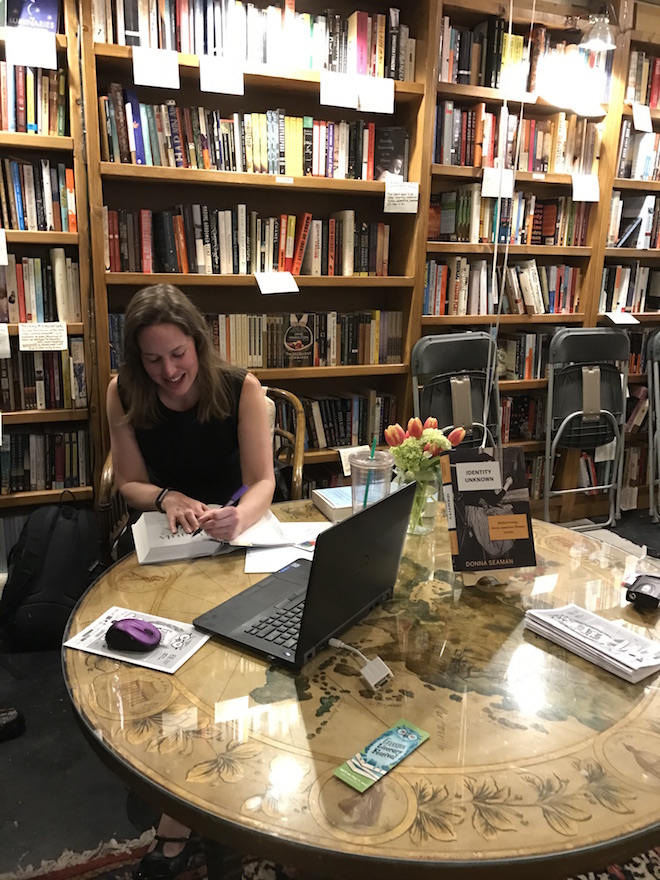
Psychology professor Renee Engeln signs copies of her book, Beauty Sick, at Bookends & Beginnings.
Photo by Yoonjie Park / North by Northwestern
Bookends & Beginnings, an independent bookstore in Evanston, held a book-signing event for Northwestern psychology professor Renee Engeln’s book, Beauty Sick, as part of the yearlong Women’s Voices Project which highlights women’s works to create a dialogue about women and their achievements Sunday night. The event drew over 70 audience members, a mix of undergraduate and graduate students, alumni, locals, friends and family, and even one of the women featured in the book.
“Beauty sickness is when you get so caught up in how you look that it’s taking really valuable energy and time away from other things that you actually care more about. So, that’s what I ended up writing about,” Engeln said. Engeln teaches 11 different courses and runs the Body & Media lab here at Northwestern.
“I am chronically beset with the belief that no one will come, except for my dad, who will always be here. And you do, so thank you for that,” Engeln said as she spoke to the packed room at the beginning of the event.
Engeln became aware of the problem she now calls “beauty sickness” as she was teaching her first class, the Psychology of Women.
“I got to know these women and I would hear them talking before and after class, and some of the things I was hearing got me worried,” Engeln said. “As a champion worrier, I started worrying about these young women. They would have ten minute conversations about how to sit down so that your thighs don’t spread, and one girl talked about how she felt so ugly that she didn’t leave her room that day.”
Many advertisements promise that a single diet pill or a specific diet plan can change women’s lives. “If anyone gives you a simple solution to a complicated problem, you should question it,” said Engeln. “These cultural messages make you feel like it’s your job to be beautiful. But unless you’re a model or an actress, it’s not your job.”
Engeln then read an excerpt of her book, which discussed M.K., one of the women she had interviewed, and her story about “the psychological costs of beauty sickness” M.K., who was in the audience for the event, then talked about how important intervention is, and that by fostering children early, “you can protect them.”
In the following Q&A session, Engeln talked about the impact the election had on her book. “When you have a leader who refers to women as numbers or body parts, the message is, it’s okay, you can talk this way about women. What the election’s done is brought a lot of this more into the public eye,” Engeln said.
“The event was an interesting start of the conversation, of a much longer conversation,” Chicago resident Pam Tierney said. She attended the event after reading an article about Engeln’s book in the Chicago Tribune. “It’s something I’ve been thinking about for quite a while. How do we change how we talk to each other? What kind of language do we replace ‘Oh my gosh, you look so great today’ with? How do we talk to our thirteen year old nieces?”
Rebecca Rubin, a Skokie resident, came to the event for her daughter, who is planning to minor in psychology. “My ex-husband once corrected me when my daughter did something wrong, and I said, ‘Molly, that’s not very attractive.’ My husband said, ‘Don’t say that to her.’” Rubin added that she has to “stop myself from saying that she’s beautiful. I want her to know that she’s smart, creative and thoughtful.”
Engeln’s speech addressed many of those issues, and she although just published her book last week, she has already started receiving feedback.
“I mean, publicity has just started, so we’ll see,” Engeln said. “It is scary though. You get unkind emails from strangers who want to tell you about how wrong you are about everything and how you’re a terrible feminist and all those sorts of things. So that part’s not fun, but so far it’s been good. It gives me a chance to talk to people I wouldn’t otherwise get to talk to, and I think that science is meant to be shared.”